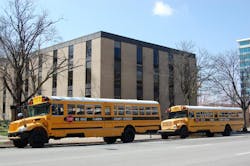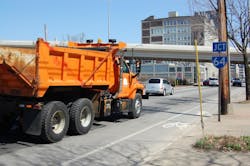Indeed, one of the biggest policy debates fueling the run-up to the U.S. presidential election in November is whether allow taxation rates to increase across the board at the federal level, keep them at current levels, eliminate a variety of special “loopholes,” and deal with spending levels order to control (and hopefully start shrinking) the nearly $16 trillion national debt.
At the state level, of course, there’s an added challenge in that almost every state constitution requires the annual budget to be in balance with tax revenue. As a result, many states are raising taxes and fees, cutting back on services, slashing pay, pensions, and health benefits for state workers, or some measure of all three.
One area where states are starting to cut back significantly is aid to local governments – thus many localities to embark on their own efforts to cut costs, raise revenues, and the like. Many truckers, of course, worry (and are right to do so) that localities they reside in may raise any number of fees to make up for tax revenue shortfalls – hitting them right in the wallet and thus possibly increasing the “pile on” effect from similar efforts at the state and federal level.
However, according to a new report, what seems to happening instead is that many cities, counties and school districts are cutting back on a wide front: eliminating jobs; increasing class sizes and shortening school days; reducing services such as public safety, library hours and trash collection; and privatizing functions such as park maintenance and 911 dispatching, among other measures.
"In many places, the impact of revenue shortfalls and increased need for services has been wide and deep," noted Robert Zahradnik, director of research for the American Cities Project, funded by the Pew Charitable Trusts.
"Going forward, local policy makers will have more tough choices to make,” he stressed in the group’s new report, dubbed The Local Squeeze. “It is unclear whether these changes will be temporary or permanent, but the impacts of the squeeze will be felt for years to come.”
Zahradnik said that while states slowly rebound from the Great Recession, many local governments are struggling with unprecedented fiscal challenges and – for the first time since 1980 – state aid and property taxes, two primary sources of funding for local entities, are dropping simultaneously.According to Pew’s report, property tax revenue, which accounts for nearly 30% of local budgets, continues to shrink – reflecting the drop in real estate prices during the recession. Home prices fell by nearly 20% since 2007, with some states, like Arizona, seeing much sharper declines. In 2010, property tax collections were 2.5% or $11.9 billion lower than in 2009 and the drop proved even steeper last year, at 3.1%, with declines are expected to continue in 2012 and 2013.
To cover this shortfall, some localities have raised rates, but many are limited from doing so by state law, Zahradnik said.
At the same time, state aid, which on average amounts to almost one-third of local budgets, has also declined with Pew’s researchers noting that in fiscal year 2010, it dropped by $12.6 billion, or 2.6%, with 26 states reporting that they cut funding for fiscal year 2011 as well. Nebraska, for example, cancelled all state aid to cities and counties that year.
School districts, which historically have been spared, are now frequent targets of cuts, noted Pew’s team, with 37 states cutting school funding in the 2011-2012 school year.While a number of districts, cities, and counties are fighting back with lawsuits, many policy makers in at the state level – especially in New Jersey and Ohio – argue that reduced aid will encourage local governments to become “more efficient” and make “more strategic” budget choices.
One aspect of such efforts going forward remains employment reduction. Indeed, Pew noted that local governments shed half a million jobs from 2008 to 2011, including close to 100,000 workers in California alone.
On the more positive side, localities are now also rethinking the way they do business – mirroring efforts that the state level to explore privatization, regional partnerships or technological innovations to try to reduce costs and increase efficiency.
These trends hold both good and bad news for truckers. On the one hand, privatization efforts could open the doorway to more trash collection contracts, maintenance contracts, and other vehicle-related business. On the other, however, fewer employees could increase delays for all kinds of paperwork trucking concerns need to obtain in order to keep functioning (not that such paperwork always got complete speedily in the past, mind you.)
There are also darker thoughts as to how local government need for funds may influence enforcement activity against commercial vehicles. That is all part of the larger government revenue-shortfall picture coming into focus across America today and how it may – or may not – affecting trucking’s bottom line in the process.






